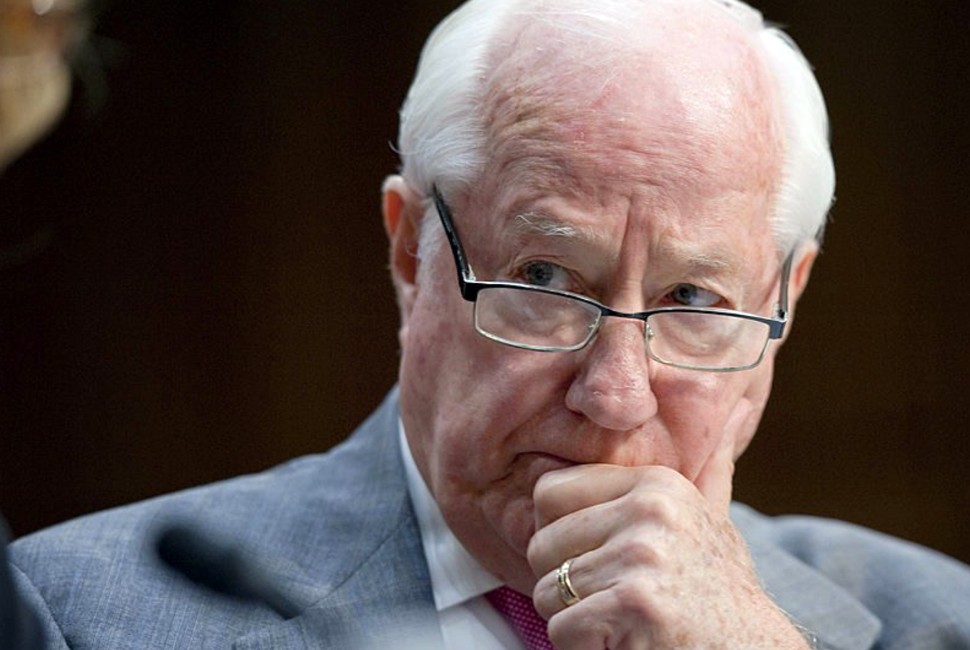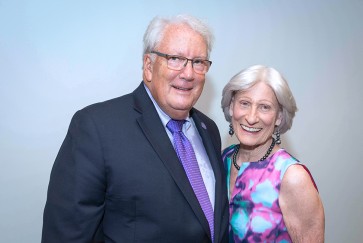James T. Kolbe ’65 — a former U.S. Representative from Arizona, Navy veteran and Northwestern alumnus who was the second openly gay Republican in Congress — died Dec. 3, 2022, at age 80.
Kolbe represented the Tucson area, serving for 22 years in the House from 1985 until his retirement in 2007. During his tenure in Washington and after he left Congress, he was seen as a moderate, advocating for bipartisanship amid increasing polarization.
A longtime Washington insider and friend of leading politicians, including the late Arizona senator John McCain, Kolbe was a strong proponent of free trade and one of the architects of the North American Free Trade Agreement in the early 1990s. Though he considered himself fiscally conservative, he supported abortion rights, as well as international development and immigration reform.
“Jim Kolbe was a fine congressman and great friend to Northwestern University — and to me personally,” said Henry Bienen, former president of Northwestern. “Jim was a committed alumnus, a political science major. He was a thoughtful legislator. He was respected by both sides of the aisle and worked hard for Arizona. When he came out as a gay man, he fought for equal rights. Jim is missed by many.”
Kolbe’s decision to publicly come out as gay in the summer of 1996 — preempting a magazine that had threatened to out him — led to national recognition. Not all of the attention he received for coming out was positive, but Kolbe persisted and won reelection just a few months later.
He became an advocate for gay rights, supporting legislation to eliminate the military’s “Don’t Ask, Don’t Tell” policy. Kolbe also worked to combat hate crimes and stop employment discrimination, and advocated for federal recognition of same-sex marriage. In addition, he advised the Log Cabin Republicans, a conservative group that advocates for LGBTQ+ rights, and made many speaking appearances.
In an interview with CNN’s Jake Tapper in 2014, Kolbe said it was “morally indefensible to say that people should be able to discriminate on the basis of one’s sexual orientation,” when asked about a proposed law in the Arizona legislature that would have allowed businesses to refuse service to LGBTQ+ customers.
He became disillusioned with the trajectory of the Republican party toward the end of his life, according to the Arizona Republic, and formally left it in 2018 to become an independent. Kolbe endorsed Joe Biden for president in 2020 in a video address and Arizona Daily Star column that emphasized the importance of bipartisanship and that the United States should be a beacon of democracy — both principles that he felt the Republican party had strayed from.
Kolbe was born in Evanston on June 28, 1942. While he was growing up, his family moved to Arizona, where they operated a ranch in Santa Cruz County. In Arizona, Kolbe became a young supporter of U.S. Sen. Barry Goldwater, one of the founders of modern conservatism. Kolbe moved to Washington, D.C., to serve as a Senate page for Goldwater at age 15, graduated from the Senate’s page school, and returned to his hometown of Evanston to attend Northwestern.
At Northwestern, Kolbe majored in political science and was involved in several student organizations. He was a member of the Acacia fraternity, and participated in student government, Young Republicans and Navy ROTC.
After graduating in 1965, Kolbe went on to Stanford University, where he earned an MBA in 1967. Beginning that year, he served on Navy gunboats in Vietnam, where he earned a congressional medal for valor. Upon returning home, he worked in Illinois politics and the real estate business in Arizona.
Kolbe was elected to the Arizona state senate in 1976, serving until 1982. In 1984, he was elected to the U.S. Congress. While in Congress, he served as chairman of the House Appropriations subcommittee on foreign operations, and was sometimes at odds with his fellow Republicans on social issues and free trade. He spoke at the Republican National Convention in 2000, where some participants publicly called out his sexuality and protested, bowing their heads during his speech.
After retiring, Kolbe remained active in public life, becoming a fellow at the German Marshall Fund — a think tank focused on cooperation between Europe and the United States — and sitting on many boards. He also served as a consultant at Kissinger McLarty Associates and taught at the University of Arizona’s law school.
Kolbe maintained connections to Northwestern throughout his life as a University donor and participant in mentorship and advising programs for students interested in politics and public service, including the Career Treks program and the Northwestern Alumni Association Mentoring Program.
He was also a member of the Northwestern University Clubs of Tucson and Washington, D.C., Northwestern Pride Alumni and the Weinberg College of Arts and Sciences’ Board of Visitors from 1990-2013. In 1993, he received an alumni merit award from the Northwestern Alumni Association.
According to the Arizona Daily Star, Kolbe’s legacy includes natural landmarks in Arizona that he helped preserve while in office, including Canoa Ranch, a 4,800-acre conservation park, the Las Cienegas National Conservation area, and elevating Saguaro National Monument to a National Park.
Reflecting on his work with Goldwater, McCain and Arizona Democrat Mo Udall in 2020, Kolbe said all of them recognized that “We weren’t going to get things done in Congress — we weren’t going to get things accomplished in this country — if we didn’t work together ... That’s what most Americans want us to do: find common ground.”
Kolbe is survived by his husband, Hector Alfonso, sister, Beth Kolbe, sister-in-law, Mary Kolbe, sister, Ginny Rousseau and her husband, Dennis Burnett, as well as several nieces, nephews, great nieces and nephews and their spouses.
“If I am going to be remembered,” Kolbe said, according to his husband Hector, “I would like for the world to know that I was proud to be a good mentor to young aspiring professional men and women.”


